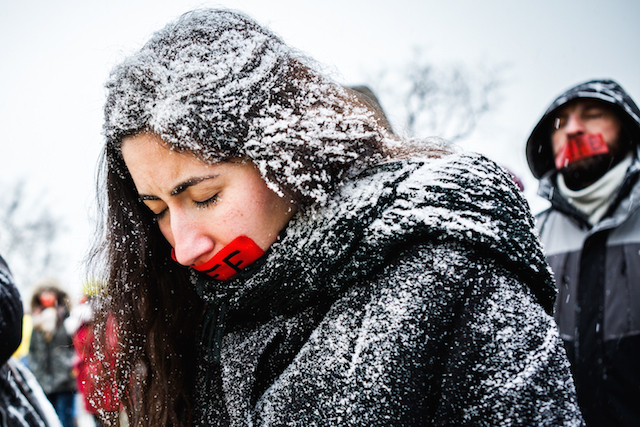In a setback for New Hampshire pro-lifers, a federal judge tossed out a lawsuit challenging the state’s restrictive 25-foot buffer zone around abortion facilities.
The Union Leader reports U.S. District Court Judge Joseph Laplante called the pro-lifers’ lawsuit “premature” and ruled on April 1 that they did not show how their rights have been violated. Buffer zones are a tool that abortion supporters use to restrict pro-lifers’ freedom of speech, often preventing them from approaching women to offer options other than abortion.
In his ruling, Laplante said the pro-lifers “have not demonstrated that they suffered any cognizable injury attributable to the defendants or that threatened enforcement of the statute chilled their speech.” He said none of the abortion clinics in New Hampshire have used the law to created barriers for protesters yet.
The local news reports more about the situation:
The ruling affects clinics in Greenland, Keene, Manchester and Concord. Laplante left open the possibility that the law could be challenged on its merits, if any of the clinics ever decide to take advantage of it.
Both sides are now pondering their next move in a legislative and legal debate that has gone on for two years, against the backdrop of a Massachusetts case that went all the way to the U.S. Supreme Court. In June 2014, the high court unanimously struck down a Bay State law establishing a 35-foot buffer zone around abortion facilities.
Anti-abortion protesters in New Hampshire, with Catholic nun Mary Rose Reddy as the lead plaintiff, filed suit in July of 2014 to block a similar law from taking effect in New Hampshire, with Attorney General Joseph Foster named as lead defendant.
The abortion clinic operators agreed not to erect any barriers while the court case was pending and the state Legislature was revisiting the buffer zone law in light of the Massachusetts ruling.
In 2015, the House passed a bill overturning the New Hampshire buffer zone, but it was tabled in the Senate on a 12-12 vote. The repeal measure is up for consideration again this year. Having already passed in the House, it’s scheduled for hearings today before the Senate Health and Human Services Committee.
Pro-lifers are hopeful that the setback will be temporary. Matthew Bowman, an attorney with the pro-life legal group Alliance Defending Freedom, is representing the pro-lifers.
“The court ruling in no way suggests that these anti-speech zones are acceptable,” he told the news outlet. “It explicitly said that they can be challenged in court. What the ruling suggests to me is that Planned Parenthood has no rationale for these zones, and no problem exists to justify them, because they haven’t bothered to draw them in two years.”
The New Hampshire law explicitly exempts abortion facility escorts, allowing such individuals to engage in speech and expressive activities favorable to abortion – encouraging and compelling women to enter the abortion facilities and continue with the abortions – while prohibiting pro-life advocates from engaging in any expressive activity within the zones, LifeNews previously reported.
CLICK LIKE IF YOU’RE PRO-LIFE!
“Americans have the freedom to talk to whomever they please on public sidewalks,” ADF Senior Legal Counsel Matt Bowman said previously. “That includes peaceful pro-life advocates who just want to offer information and help to women who would like it. The Supreme Court recently affirmed this vital freedom, which has been an essential part of American life since the nation’s founding. New Hampshire’s law suffers from the same unconstitutional problems as the one the Supreme Court struck down.”
In 2014, the U.S. Supreme Court unanimously struck down a similar Massachusetts law in McCullen v. Coakley, a case Alliance Defending Freedom attorneys and allied attorneys filed in 2008.
In late March, pro-lifers in Pennsylvania also filed a lawsuit to overturn a buffer zone ordinance in the state capital of Harrisburg, saying it violates their freedom of speech.








